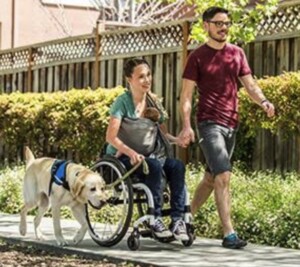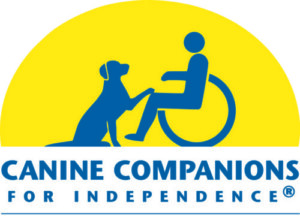Founded in 1975, Canine Companions for Independence® is a non-profit organization that enhances the lives of people with disabilities by providing highly trained assistance dogs and ongoing support to ensure quality partnerships.
 The assistance dogs we breed, raise and train aren’t just the ears, hands and legs of their human partners. They’re also goodwill ambassadors and often, their best friends. They open up new opportunities and new possibilities, and spread incredible joy. We unite people with dogs in a powerful program that leads to greater independence and confidence.
The assistance dogs we breed, raise and train aren’t just the ears, hands and legs of their human partners. They’re also goodwill ambassadors and often, their best friends. They open up new opportunities and new possibilities, and spread incredible joy. We unite people with dogs in a powerful program that leads to greater independence and confidence.
Canine Companions breeds Labrador Retrievers, Golden Retrievers, and a cross of the two to be assistance dogs. Volunteers care for our breeder dogs and nurture newborn puppies for eight weeks. Canine Companions puppies spend the next 14-18 months with volunteer puppy raisers who provide basic obedience training, socialization and care.
Dogs are trained to perform a variety of tasks, and we place our dogs in teams that will utilize their training and celebrate their spirits.
Different Types of Canine Companion Assistance Dogs
Service Dogs
Imagine having a dog that could turn on lights, pick up dropped keys and open a door. Canine Companions for Independence service dogs are partnered with adults with physical disabilities to assist with daily tasks and increase independence by reducing reliance on other people. A service dog can pull their partner in a manual wheelchair, push buttons for elevators or automatic doors, and even assist with business transactions by transferring money, receipts, and packages.
Hearing Dogs
Canine Companions for Independence hearing dogs are specially bred Labrador and Golden Retrievers who alert partners to key sounds by making physical contact such as nudging the leg or arm. Among the many sounds hearing dogs are trained to recognize and respond to are the sound of a doorbell, alarm clock, someone calling a name or a smoke alarm.
Facility Dogs
Facility dogs are expertly trained dogs that are partnered with a facilitator working in a health care, visitation or education setting. Canine Companions facility dogs are trustworthy in professional environments and can perform over 40 commands designed to motivate and inspire clients with special needs. Facilitators are working professionals responsible for handling and caring for the facility dog. Additionally, facilitators are committed to long-term employment where they directly serve clients with special needs a minimum of twenty hours per week. One of the most valued qualities of the facility dog is the unconditional love and attention it gives to the clients and patients with whom it interacts.
Skilled Companions
Our skilled companions are trained to work with an adult or child with a disability under the guidance of a facilitator. A facilitator is typically a parent, spouse or caregiver who handles and cares for the assistance dog, encourages a strong bond between the recipient and the skilled companion dog, and is responsible for the customized training needs of the dog.
Assistance Dogs for Veterans
Canine Companions recognizes the urgent and growing need for programs that provide support to veterans with disabilities. Many of the brave men and women returning home from combat with disabling injuries experience a litany of new challenges.
Often, they face difficult transitions back to civilian life as well as uncertain futures with new disabilities. Canine Companions assistance dogs can help veterans regain independence, pride and hope. Beyond much-needed physical assistance, the love, loyalty and positivity of a canine partner can make a profound, lasting impact on someone dealing with difficult emotions that are hard to communicate.





